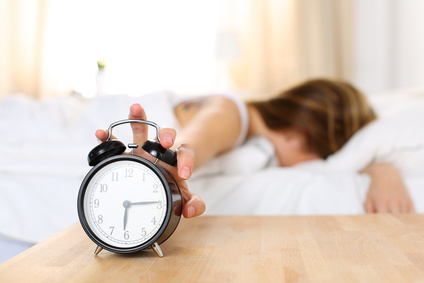
by Matilda Davies
As good as it feels to hit that snooze button in the morning for just a few more minutes of sleep, failing to get up with your alarm can have detrimental effects on your mental and physical health. From preventing mental stimulation to inhibiting productivity, there is a whole host of reasons to get up the moment your alarm sounds.
Here’s why hitting the snooze button is bad for your health—and what you can do to bust this bad habit.
1. It eats up your morning, which can trigger stress
One sure-fire way to generate stress in your life is to not give yourself enough time in the morning to set the tone for your day.
If you keep hitting snooze until the last possible moment, you’ll feel rushed to get out the door.
Get out of bed with enough time for comfortably prepare for the day—and not just hurriedly getting dressed and making coffee.
Allow yourself time for ten minutes of meditation, a moment to check in on the news, eat breakfast with your family, and pause before the day kicks in.
2. It kills routine, which can induce anxiety
Having a regular daytime routine has been linked to healthier sleeping cycles and improved mental health. By waking up with your alarm at the same time every day (at least every week day), you can eventually train your body to get up at the same time—with no need to lean on that tempting snooze button.
Routine will also help you work into your schedule exercise, meditation, and healthful eating as well—all pros both for your mental and physical health.
3. Your body needs time to “wake up”
Let’s be honest, no one is actually jumping out of bed at the sound of our alarms, but if we’re doing it right, we use our alarm as a way to trigger the wake-up process.
Biological clocks control our circadian rhythms (or mental, physical, and behavioral changes), which in turn control our sleep cycles, which is how our bodies know when to sleep and when to wake up.
Medicine suggests that waking up slowly is actually the best for our bodily clocks and for preserving our natural sleep cycles, which can mean better quality sleep over the long haul.
How to Stop Hitting the Snooze Button
1. Put your alarm clock across the room
Put your alarm clock across the room so you’re forced to get out of bed to turn it off.
While you don’t necessarily have to begin the day right there, you might take a few moment to sit back in bed and slowly wake up, check in on the news, drink a glass of cool water, or turn on some soft music.
2. Try a sunrise clock
A sunrise clock uses light to slowly wake your body rather than jolting it awake with harsh noise. This is often a more pleasing and sustainable way for most to begin their day, and can also help balance your circadian rhythms.
Many believe this this is a more natural way for your body to wake up—it is, after all, how our ancestors did it.
2. Create a reward on the other side
In order to get into the habit of getting up with your alarm, you can reward yourself with something pleasant—a cappuccino at a favorite coffee shop, a favorite podcast, enough time to read the paper or to walk to work instead of driving or taking the train.
Giving yourself that something to reach for can give you great reason to pull yourself out of bed earlier than later.
3. Get enough sleep
Don’t set unrealistic expectations for yourself. If you’re not a morning person, it’s not likely you’ll get up two hours before you have to leave to get in an intense workout—it’s just not likely to happen.
It’s recommended that most adults get roughly 7–9 hours of sleep each night, so going to bed earlier may help you bust the snooze cycle.
Even if you have to write it into your schedule, go to bed with enough time to get the sleep your body needs for better health.
4. Exercise
Studies show that people who exercise regularly report getting higher quality and more sleep than those who do not exercise. If you’re having trouble falling asleep at night or you’re finding that you toss and turn or that you’re still exhausted in the morning after your 7–9 hours, some moderate exercise during the day may be the trick to getting better sleep and skip the snooze.
(Matilda Davies lives in Raleigh, North Carolina, where she writes about health and wellness. In her free time, she enjoys yoga, hiking, and walking her dogs.)



